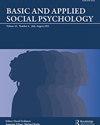Nudging is Ineffective When Attitudes Are Unsupportive: An Example from a Natural Field Experiment
IF 1.8
3区 心理学
Q2 PSYCHOLOGY, SOCIAL
引用次数: 13
Abstract
Abstract For security reasons, employees of a Dutch local government department needed to wear an identifying lanyard with their employee badge, but compliance with this policy was low. Two nudges to increase compliance were evaluated in a pre-registered natural field experiment using a pre-post design, and a qualitative survey. Bayesian inference provides insufficient support for the effectiveness of the nudges. While more respondents judged the nudges and the lanyard policy positively than negatively, there was substantial negative judgment and incomprehension for both with some employees finding the nudges paternalistic. We hypothesize that the nudges were ineffective because they failed to change attitudes about the policy, and because they led to reactance among some employees. Implications for nudging within organizations are discussed.当态度不支持时,裸体是无效的:一个来自自然田野实验的例子
摘要出于安全考虑,荷兰地方政府部门的员工需要佩戴带有员工徽章的识别系索,但遵守这一政策的情况很低。在一项预先注册的自然野外实验中,使用前后设计和定性调查对两种提高依从性的措施进行了评估。贝叶斯推理对轻推的有效性提供的支持不足。虽然更多的受访者对轻推和系索政策的评价是正面的,而不是负面的,但对两者的评价都是负面的,有些员工认为轻推是家长式的。我们假设,这些推动是无效的,因为它们未能改变人们对政策的态度,也因为它们导致了一些员工的抵触情绪。讨论了组织内部推动的影响。
本文章由计算机程序翻译,如有差异,请以英文原文为准。
求助全文
约1分钟内获得全文
求助全文
来源期刊

Basic and Applied Social Psychology
PSYCHOLOGY, SOCIAL-
CiteScore
4.50
自引率
12.50%
发文量
7
期刊介绍:
Basic and Applied Social Psychology (BASP) emphasizes the publication of outstanding research articles, but also considers literature reviews, criticism, and methodological or theoretical statements spanning the entire range of social psychological issues. The journal will publish basic work in areas of social psychology that can be applied to societal problems, as well as direct application of social psychology to such problems. The journal provides a venue for a broad range of specialty areas, including research on legal and political issues, environmental influences on behavior, organizations, aging, medical and health-related outcomes, sexuality, education and learning, the effects of mass media, gender issues, and population problems.
 求助内容:
求助内容: 应助结果提醒方式:
应助结果提醒方式:


